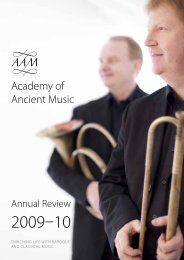JS Bach's forebears (PDF) - Academy of Ancient Music
JS Bach's forebears (PDF) - Academy of Ancient Music
JS Bach's forebears (PDF) - Academy of Ancient Music
You also want an ePaper? Increase the reach of your titles
YUMPU automatically turns print PDFs into web optimized ePapers that Google loves.
<strong>Academy</strong> <strong>of</strong> <strong>Ancient</strong> <strong>Music</strong><br />
Back in 1973, most orchestras played old music<br />
in a modern style. Centuries <strong>of</strong> change had<br />
eroded the sound-worlds known to Bach,<br />
Handel, Haydn and Mozart: the instruments were<br />
different; the pitch was different; the number <strong>of</strong><br />
players was different; the very essence and spirit<br />
<strong>of</strong> performances was different.<br />
But change was in the air. Wouldn’t it be<br />
wonderful, people asked, if we could turn the<br />
clock back; if we could find out more about<br />
composers’ original intentions and get closer to<br />
the style in which music was originally<br />
performed? This was the spirit in which<br />
Christopher Hogwood founded the AAM. It was<br />
revolutionary. Centuries <strong>of</strong> convention were cut<br />
away and baroque and classical masterworks<br />
were heard anew. The stringed instruments in<br />
Hogwood’s new orchestra had strings made <strong>of</strong><br />
animal gut, not steel. The trumpets have no<br />
valves. The violins and violas didn’t have chinrests,<br />
and the cellists gripped their instruments<br />
between their legs rather than resting them on<br />
the floor. It wasn’t just the instruments or the<br />
sound <strong>of</strong> the music which changed, though; it<br />
was how it felt. AAM performances were full <strong>of</strong><br />
energy and passion and joy.<br />
From these beginnings, one <strong>of</strong> the world’s great<br />
orchestras was born. Over the next three<br />
decades the AAM’s fame spread to every corner<br />
<strong>of</strong> the globe as it built up a celebrated<br />
discography <strong>of</strong> well over 250 CDs — Brit- and<br />
Grammy-award-winning recordings <strong>of</strong> the great<br />
baroque masterworks; opera releases starring<br />
Cecilia Bartoli, Dame Emma Kirkby and Dame<br />
Joan Sutherland; pioneering cycles <strong>of</strong> the Mozart<br />
and Beethoven symphonies. It performed live<br />
on every continent except Antarctica, inspiring<br />
music lovers worldwide with the passion and the<br />
power <strong>of</strong> its music-making.<br />
Richard Egarr — a leading light in the next<br />
generation <strong>of</strong> early music specialists —<br />
succeeded Hogwood in 2006. In his first four<br />
years as <strong>Music</strong> Director his recordings with the<br />
orchestra have won the Edison, Gramophone<br />
12 ACADEMY OF ANCIENT MUSIC, 2010-2011 SEASON<br />
and MIDEM Awards; and he has directed<br />
hundreds <strong>of</strong> performances across four<br />
continents. The orchestra continues to work<br />
with a roster <strong>of</strong> guest directors including Pavlo<br />
Beznosiuk, Giuliano Carmignola, Paul Goodwin,<br />
Stephen Layton and Masaaki Suzuki, ensuring<br />
that new ideas and approaches continually<br />
inspire the group. In 2009 the AAM made history<br />
with the world’s first-ever live choral “cinecast”: its<br />
performance <strong>of</strong> Handel’s Messiah was beamed in<br />
real time from the King’s College Chapel,<br />
Cambridge to tens <strong>of</strong> thousands <strong>of</strong> people in<br />
over 250 cities around the globe.<br />
“The ultimate raspberry to anyone who<br />
says baroque music is predictable”<br />
THE INDEPENDENT, 2009<br />
Today, the AAM’s concert series in London and<br />
Cambridge lies at the heart <strong>of</strong> its work. This<br />
season’s programme is based around The Bach<br />
Dynasty — a major new concert series exploring<br />
the music <strong>of</strong> <strong>JS</strong> Bach and his many composerrelatives.<br />
Other highlights include Mozart’s early<br />
opera La Finta Giardiniera at the Barbican, and an<br />
intriguing programme showcasing the littleknown<br />
baroque and classical music <strong>of</strong> South<br />
America. The orchestra will collaborate with the<br />
likes <strong>of</strong> Bernard Labadie, acclaimed director <strong>of</strong><br />
Les Violons du Roy, singers James Gilchrist,<br />
Rosemary Joshua, Andrew Kennedy and<br />
Elizabeth Watts, cellist Steven Isserlis, and the<br />
Choir <strong>of</strong> King’s College, Cambridge.<br />
The AAM’s international touring schedule in<br />
2010-11 is as wide-ranging as it has ever been.<br />
Among this year’s highlights are performances <strong>of</strong><br />
<strong>JS</strong> Bach’s Brandenburg Concertos and Haydn’s<br />
The Creation at the Shanghai Concert Hall and in<br />
Perth; concerts with the star Korean soprano<br />
Sumi Jo at the National Centre for the<br />
Performing Arts in Beijing and around Singapore,<br />
South Korea and Taiwan; and performances in<br />
leading European venues including the<br />
Concertgebouw in Amsterdam and the Théatre<br />
des Champs-Elysées in Paris.



